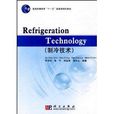《普通高等教育十一五國家級規劃教材·製冷技術》為高等教育“十一五”國家級規劃教材,是國內第一本有關製冷技術的英文教材。《普通高等教育十一五國家級規劃教材·製冷技術》詳細地闡述製冷的基本技術,介紹了近20多年來製冷技術的重要發展,也適當地介紹國內外製冷行業的動態。《普通高等教育十一五國家級規劃教材·製冷技術》共13章,包括4個部分。第1部分主要介紹製冷的範疇、套用、發展歷史和國內外的學術組織和刊物。第2部分系統敘述製冷原理,討論製冷循環的熱力學分析、使工質降溫的基本方法(包括流體製冷工質和固體製冷工質)、氣體製冷循環、機械驅動和熱驅動的蒸汽壓縮製冷循環、蒸汽壓縮製冷的循環分析。第3部分詳細介紹製冷用的工質,討論了製冷循環對工質的要求,工質的物理、化學和製冷的特性;某些製冷工質破壞臭氧層和增強溫室效應的機理和程度,新的環境友好的製冷工質;同時也介紹了濕空氣學與空氣處理過程。第4部分介紹蒸汽壓縮製冷循環的主要部件和設備,包括壓縮機、冷凝器、蒸發器和流量控制部件。
基本介紹
- 書名:普通高等教育十一五國家級規劃教材•製冷技術
- 出版社:科學出版社
- 頁數:295頁
- 開本:16
- 品牌:北京科瀚偉業
- 作者:華澤釗
- 出版日期:2009年4月1日
- 語種:簡體中文
- ISBN:9787030243041, 7030243048
內容簡介
《普通高等教育十一五國家級規劃教材·製冷技術》可作為製冷、動力、建築空調等專業的英語教材,也可供製冷、空調、動力等公司、企業的技術人員參考。
圖書目錄
Chapter 1 Introduction to Refrigeration
1-1 A Sample of Refrigeration System——Split Room Air Conditioner
1-2 Definition and Scope of Refrigeration
1-3 Main Applications of Refrigeration
1-4 History of Refrigeration in the World
1-5 Refrigeration in China
1-6 Academic Organizations and Journals of Refrigeration in the World
1-7 Academic Organizations and Journals of Refrigeration in China
References
Part Ⅱ The Principles of Refrigeration
Chapter 2 Thermodynamic Analyses of Refrigeration Cycle
2-1 The Laws of Thermodynamics and Their Relation to Refrigeration
2-2 The Refrigeration Cycle and its Main Components
2-3 The Performance of Refrigeration System
2-4 Entropy Analyses Method of Refrigeration System
2-5 Work and Heat Operated Refrigerators
2-6 Lorenz Cycles for Variable Temperature Heat Source and Heat Sink
References
Chapter 3 Methods,of Decreasing Temperature (I)——Related to Gas and Liquid Refrigerants
3-1 Decreasing Temperature by Adiabatic Throttling——J-T Effect
3-2 Decreasing Temperature by Pressure Reduction in Two Phase Region
3-3 Decreasing Temperature by Adiabatic Expansion of Gas with Doing Work
3-4 Decreasing Temperature by Adiabatic Vortex Ranque Effect
3-5 Decreasing Temperature by Variable Mass System in Unsteady Flow
3-6 Decreasing Temperature by Thermo-Acoustic Effect
References
Chapter 4 Methods of Decreasing Temperature (II)——Related to Solid Refrigerants
4-1 Decreasing Temperature by Thermo-Electric Peltier Effect
4-2 Decreasing Temperature by Magnetocaloric Effect (Adiabatic Demagnetization)
4-3 Decreasing Temperature by Photo Method
References
Chapter 5 Vapor and Gas Refrigeration Cycles
5-1 Mechanical Powered Vapor Compression Refrigeration Cycle
5-2 Heat Powered Vapor Compression Refrigeration Cycle (1)——Vapor Absorption Refrigeration
5-3 Heat Powered Vapor Compression Refrigeration Cycle (2)——Vapor Adsorption Refrigeration
5-4 Heat Powered Vapor Compression Refrigeration Cycle (3)——Vapor Jet Refrigeration
5-5 Refrigeration Cycle by Gas Compression and Adiabatic Expansion
References
Chapter 6 Cycle Analyses of Vapor Compression Refrigeration
6-1 Single-Stage Vapor Compression Refrigeration Systems
6-2 Multi-Stage Vapor Compression Systems
6-3 Cascade Vapor Compression Systems
6-4 Auto Cascade Vapor Compression Systems
References
Part Ⅲ The Refrigerants and Other Substances for Refrigeration
Chapter 7 Introduction of Refrigerants
7-1 Refrigerant in Vapor Compression Refrigeration
7-2 Refrigeration Characteristics of Refrigerants
7-3 Some Important Physical/Chemical Properties of Refrigerants
7-4 Classification and Nomenclature of Refrigerants
7-5 Secondary Refrigerants
References
Chapter 8 Environmental Friendly Refrigerants
8-1 Ozone Depletion by CFCs in Stratosphere
8-2 Montreal Protocol and its Amendments
8-3 Greenhouse Effect and Global Warming
8-4 Kyoto Protocol
8-5 Global Warming Impacts of Refrigerants
8-6 Fluorinated Refrigerants
8-7 Environmental and Thermal Properties of Natural Refrigerants
8-8 Alternative Refrigerants
References
Chapter 9 Psychrometry and Air Processes
9-1 Composition and Thermal Properties of Moist Air
9-2 Thermal Properties of Saturated Water and Saturated Moist Air
9-3 Adiabatic Saturation Process and Wet Bulb Temperature
9-4 Approximate Calculation of the Thermal Properties of Moist Air
9-5 Psychrometric Chart
9-6 Air Handing Processes
9-7 Heat and Mass Transfer Between Moist Air and Solid Surface
References
Part Ⅳ The Equipment for Refrigeration Cycles
Chapter 10 Compressors
10-1 Main Types of Compressors
10-2 Reciprocating Compressors
10-3 Scroll Compressors
10-4 Screw Compressors
10-5 Turbo Compressors
10-6 Roller Type Compressors
10-7 Vane Type Compressors
10-8 Inverter Technology and Inverter Driven Compressors
References
Chapter 11 Condensing Equipment
11-1 Function and Classification of Condensers
11-2 Water-Cooled Condensers
11-3 Cooling Tower
11-4 Air-Cooled Condensers
11-5 Evaporative Condensers
References
Chapter 12 Evaporators
12-1 Function and Classification of Evaporators
12-2 Dry-Expansion Evaporators and Flooded Evaporators
12-3 Main Types of Evaporator Construction
12-4 Air Cooler and Spray Air Cooler
12-5 Direct and Indirect Refrigeration Systems
References
Chapter 13 Refrigerant Flow Control
13-1 Hand Expansion Valves
13-2 Capillary Tube
13-3 Thermostatic Expansion Valves-Superheat Control
13-4 Automatic Expansion Valves-Evaporator Pressure Control
13-5 Electronic Expansion Valves
13-6 The Practical Refrigeration System and its Temperature and Pressure Control
References
Index

